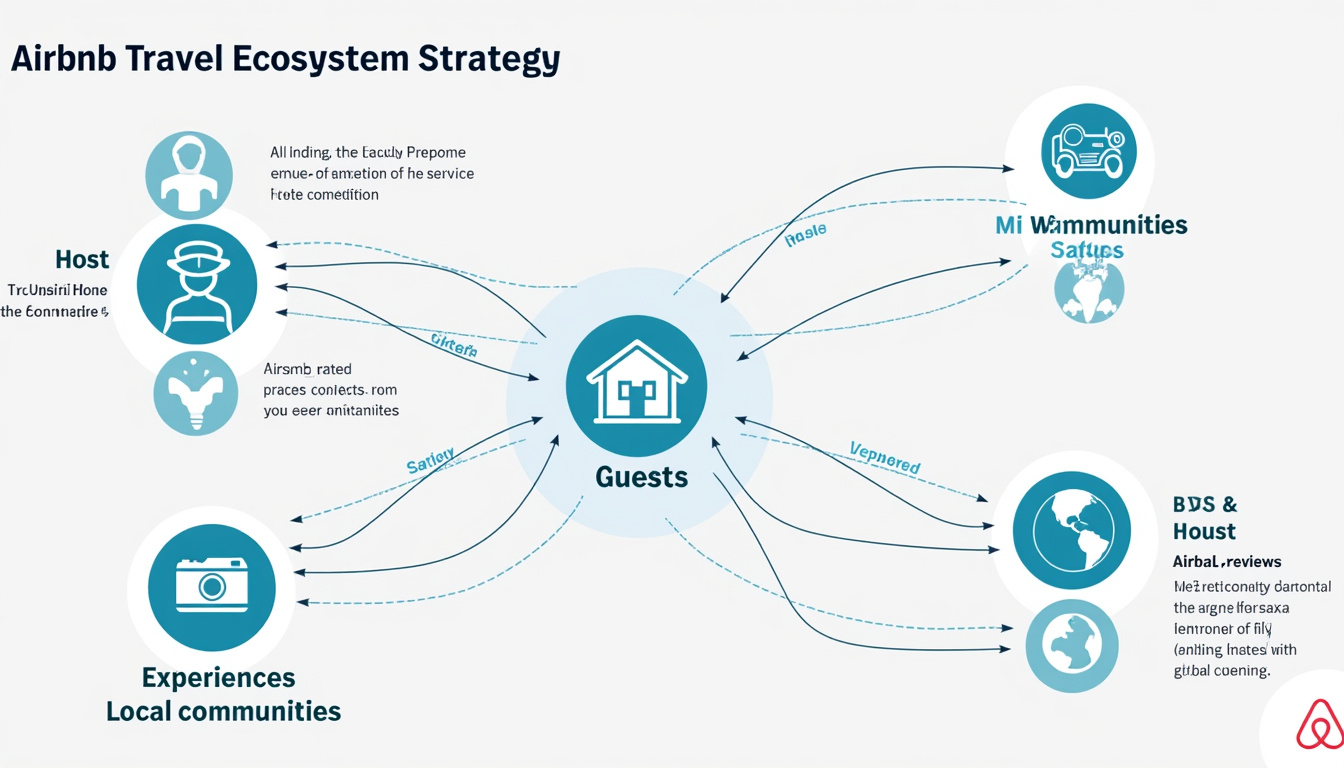In an ever-evolving travel landscape, Airbnb stands as a pivotal player, transforming the way people seek accommodations and experiences. The company, which began as a simple platform to rent out air mattresses, has now expanded into a robust ecosystem catering to millions of travelers around the globe. Yet, the journey does not end here. As Airbnb looks to the future, it must identify and leverage specific growth strategies that harness current market trends and consumer behaviors. Three strategies emerge as critical drivers for Airbnb’s continued growth: the shift toward longer stays, international expansion, and broadening its service offerings beyond traditional accommodations.
The Shift Toward Longer Stays: A New Trend in Travel
One of the most significant trends reshaping the travel industry is the increasing preference for longer stays. In 2024, approximately 18% of all nights booked on Airbnb were for stays of 28 nights or more. This shift is indicative of a broader change in societal norms regarding work and travel. The rise of remote work has enabled countless individuals to combine their professional obligations with an extended travel experience. Instead of planning brief getaways, travelers are opting for month-long adventures that allow them to explore new destinations while maintaining their jobs.
From a financial perspective, longer stays present several advantages for both hosts and the platform itself. Hosts benefit from the reduced frequency of tenant turnover, leading to increased occupancy rates and more stable income streams. For Airbnb, increased bookings can translate into enhanced revenue consistency. As these longer trend stays become more desirable, the platform must enhance its offerings and tailor marketing efforts to attract this demographic.
- Increasing visibility of long-term rental options
- Highlighting amenities conducive to work, such as high-speed internet
- Providing targeted marketing campaigns for digital nomads
If this trend continues, Airbnb could emerge as the go-to platform for remote workers and digital nomads, positioning itself favorably for sustained growth. Ensuring that hosts receive proper guidance on facilitating longer stays will be vital. It is also essential for Airbnb to communicate effectively with both hosts and guests about the benefits and logistics of extended rentals.

International Expansion: Tapping into New Markets
While Airbnb has firmly established its presence in North America and Europe, there remains a significant opportunity for growth in emerging markets. Regions such as Asia-Pacific, Latin America, and India exhibit considerable potential, driven by a rising middle class eager to travel. The recent data shows that bookings in expansion markets are growing at almost double the rate of core markets. This expanding demand underscores the necessity for Airbnb to refine its strategies tailored to these regions.
Countries like India are particularly emblematic of this growing potential. The CEO of Airbnb, Brian Chesky, aptly referred to India as a “long game” for the company. With forecasts suggesting Indian travelers might spend as much as $29 billion annually by 2029, capitalizing on this emerging market is paramount. This ambition includes establishing local partnerships, adapting offerings to suit cultural preferences, and ensuring compliance with local regulations.
However, international expansion is fraught with challenges. Airbnb must navigate local regulations, which can be variable and unpredictable. Competitors like Booking.com and Expedia are firmly entrenched in these markets, and as such, Airbnb must develop competitive marketing strategies and maintain agility to keep pace.
| Region | Potential Growth (GDP)** | Market Growth Rate |
|---|---|---|
| Asia-Pacific | $36 billion | Twice that of core markets |
| India | $29 billion by 2029 | Projected significant growth |
| Latin America | Varies by country | Increasing with middle-class travel |
When effectively leveraged, the return on investment in these new markets could significantly outweigh the initial risks. Thus, prioritizing international expansion stands as a critical pillar in Airbnb’s growth strategy.
Expanding Beyond Stays: Creating a Comprehensive Travel Ecosystem
Airbnb’s ambitions extend beyond merely providing short-term stays. The company is increasingly focusing on enhancing its Experiences segment. This initiative includes local tours, culinary classes, and various activities that travelers can engage in during their stay. By diversifying its offerings, Airbnb aims to develop a full-fledged travel ecosystem that positions the platform as a primary travel companion for consumers, not just a place to find lodgings.
Moreover, Airbnb’s long-term vision encompasses building a “personal travel concierge,” leveraging artificial intelligence to curate tailored travel itineraries for users. This strategic pivot is indicative of a broader ambition to capture a more considerable share of the traveler’s spending – expanding its revenue streams beyond housing to include activities and services.
- Improve visibility for Experiences on the platform
- Collaborate with local businesses to enhance service offerings
- Utilize customer data to present personalized recommendations
While executing this strategy may involve considerable upfront investment, the potential benefits far exceed the costs. If successful, Airbnb could open new streams of revenue that not only fortify its core business but also create additional opportunities for hosts and local entrepreneurs.

Understanding the Implications for Investors
When assessing these growth strategies, it’s crucial for investors to recognize the interconnected nature of these opportunities. The three primary drivers of growth – longer stays, international expansion, and service diversification – are not isolated. They collectively enhance Airbnb’s brand recognition, amplify its network effects, and bolster the vast community of hosts. As investors evaluate potential growth stocks, Airbnb’s strategy appears well-positioned to sustain momentum and achieve profitability.
However, the landscape is not without its challenges. Regulatory scrutiny looms large, with contenders such as Vrbo, TripAdvisor, Hilton, and others, all striving for market share. For Airbnb, vigilance in navigating these challenges while maintaining profitability is paramount. Their equity position remains robust, bolstered by an $11 billion cash reserve, allowing for ongoing investments amidst competitive pressures.
The stakes are high, but the potential for growth is ubiquitous. Investors eyeing Airbnb as a viable long-term investment should remain cognizant of the strategies at play and the competitive landscape, which emphasizes the importance of adapting to an ever-evolving travel market.
| Investment Opportunity | Risk Factors | Potential Return |
|---|---|---|
| Longer Stays | Market competition, host support | Stable income for hosts, higher occupancy |
| International Expansion | Regulatory challenges, local competitors | Access to burgeoning markets |
| Service Diversification | Execution risks, scale of investment | New revenue streams and customer loyalty |
Consolidating Growth: An Informed Path Forward
The trajectory of Airbnb’s growth is indicative of the dynamic shifts occurring within the travel industry. By embracing the rise of longer stays, pursuing international markets, and expanding its services, Airbnb positions itself to remain a dominant player in its field. As Airbnb cultivates a deeper engagement with its users and hosts, there is a palpable opportunity for sustainable growth.
Ultimately, for investors, the evolving landscape symbolizes a blend of opportunity and uncertainty, demanding careful consideration and strategic foresight. Being cognizant of the changing consumer preferences and responsive to market demands will be pivotal for Airbnb’s long-term success in a competitive hospitality arena that features giants like Marriott and Wyndham.
